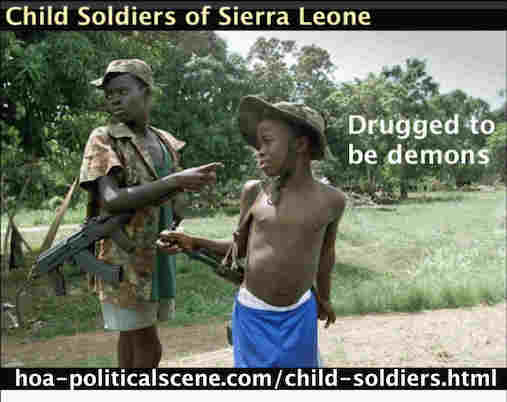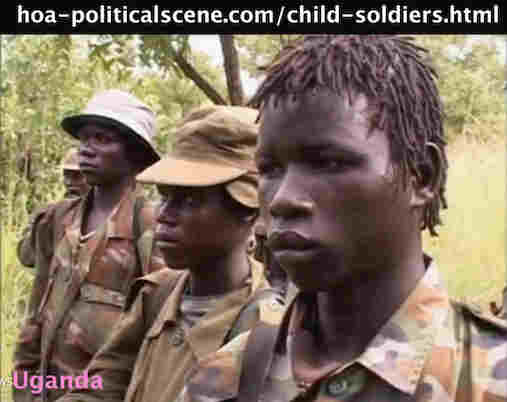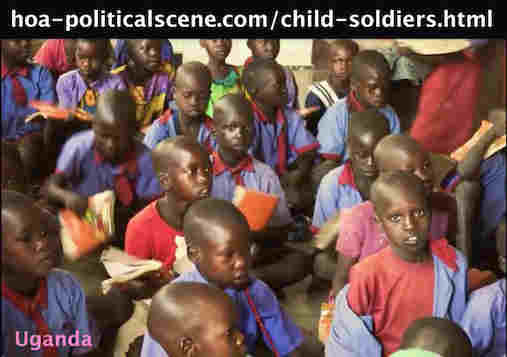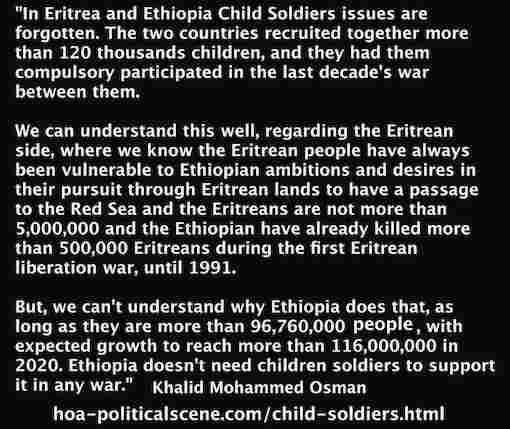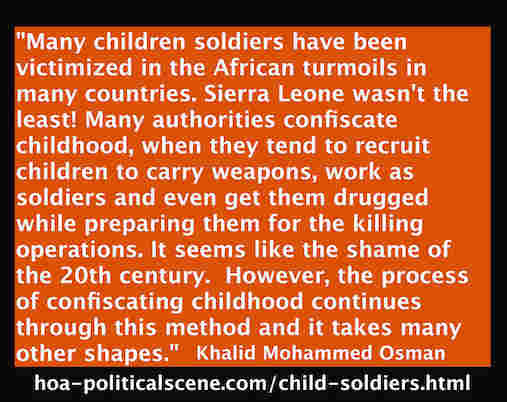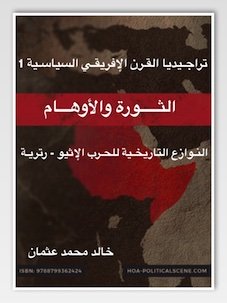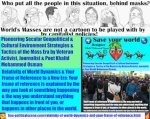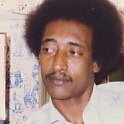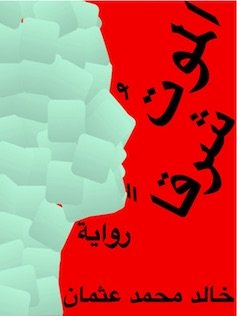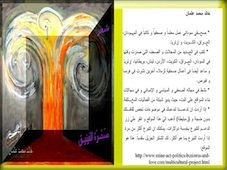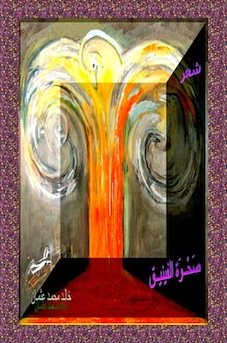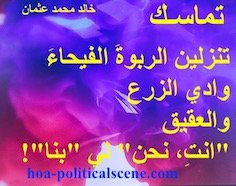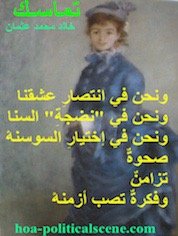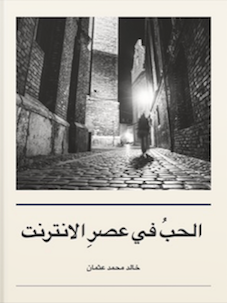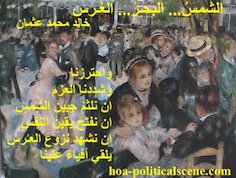HOW MUCH does Facebook pay you when you spend a lot of time to make it a billionaire while you're poor? Do you want to conquer FaceBook, Google, or any social you are using and make them pay you hard currencies for using them? That has a DYNAMIC SYSTEM. Contact Me! GET INSIGHTS ON HOAS ABOUT FACEBOOK.
Child Soldiers Indicate How the Authorities Confiscate Childhood!
Child Soldiers, or as you can also define as children soldiers did not exist only in Sierra Leone, but they are the outcome of bad policy practices in so many countries in the world. In fact, they are the real cry of many beloved countries in Africa, Asia and Latin America.
Many children soldiers have been victimized in the African turmoils in many countries. Sierra Leone wasn't the least! Here are some stories of some children soldiers.
It seems like the shame of this age. Many authorities confiscate childhood, when they tend to recruit children to carry weapons, work as soldiers and even get them drugged while preparing them for the killing operations.
They have been and they are still victimized in the African turmoils in many countries. Sierra Leone wasn't the least!
Here are some stories of some children soldiers including the child soldiers of Sierra Leone and the child soldiers of LRA in Uganda, along with the offense in the Democratic Republic of the Congo, where the DRC became vulnerable to the phobia of LRA.
Child Soldiers Cry in the Beloved African States!
There is nothing more miserable than the confiscation of childhood. But, who cares! Army commanders even rape them in the fields. Those countries are still living the same misery.
Yes, of course, the level of the misery in those countries is not reaching the level it reaches in Sierra Leone. But the misery level is alarming too in the Democratic Republic of the Congo and Uganda, as they share and face the impacts of the false holly war of the Lord's Resistance Army / Lord's Resistance Movement led by Joseph Kony.
There're schemes most of the dictators who are ruling their people by iron and fire, are setting forth in their agendas to recruit kids under 18 years to take part on the regional conflicts there.
And the complete schemes they planned for those kids in those poor African countries are provisioned to deny them their rights to complete education and normal childhood.
In Sudan for example, kids who do not complete the recruiting military schedule, and present the certificates to prove they have completed it, are not eligible to enter the university, whether they score high level in their high secondary school examination or not.
So, the dictators are still recruiting children in their Child Soldiers schemes and using them as an Islamic militia, in their false jihadist wars not against Christian Sudanese only but against Muslims too.
In Eritrea and Ethiopia Child Soldiers issues are forgotten. The two countries recruited together more than 120 thousands children, and they had them compulsory participated in the last decade's war between them.
We can understand this well, regarding the Eritrean side, where we know the Eritrean people have always been vulnerable to Ethiopian ambitions and desires in their pursuit through Eritrean lands to have a passage to the Red Sea and the Eritreans are not more than 5,000,000 and the Ethiopian have already killed more than 500,000 Eritreans during the first Eritrean liberation war, until 1991.
But, we can't understand why Ethiopia does that, as long as they are more than 96,760,000 people, with expected growth to reach more than 116,000,000 in 2020. Ethiopia doesn't need children soldiers to support it in any war.
Child Soldiers - Questions Must Have Be Asked!
The Child Soldiers issue will be the main theme on other pages we are working on with other children's issues to bring the last crisis in the Horn of Africa to the surface again, because there were many crimes against the Eritrean and the Ethiopian people conducted through history under the empirical system and even the last governments in Addis Ababa.
We are asking the International Criminal Court to investigate this issue, ask the victims of the last war, specially the victims amongst Child Soldiers.
We'll present stories about Child Soldiers from the African states on special pages on our web site for our visitors, or in our newsletter for our readers to follow up the current deterioration of the human rights in some states in Africa.
Some reports may highlight also the last decade of the 19th century. We have various issues about human rights, not only Child Soldiers. To subscribe to one of our Newsletters/Ezines see the form at the left column and request your thank you gifts when you subscribe. There you'll read also some more about Child Soldiers.
Child Soldiers at Amnesty International!
Amnesty International covers previously the crises of Children Soldiers in Freetown, West Africa on this report.
The violation of the most fundamental rights of the children of Sierra Leone is described in a disturbing report by Amnesty International. Much of the information came from the children themselves, talking to AI representatives who visited Sierra Leone in March, June and July 2000.
Names have been changed to protect identities. Children who were released or escaped, and have been disarmed and demobilised, provide horrifying accounts of how the conflict has affected them.
War children in Sierra Leone tell their stories:
Thousands of children fought as soldiers in Sierra Leone's bloody internal war. AI researchers met many of the children and heard how they were recruited and treated by military and rebel commanders, what is being done to return them to normal family life - and how renewed hostilities leave them facing a continuing nightmare.
More than 5,000 children under the age of 18, both boys and girls and some as young as five, have fought as combatants in Sierra Leone's internal armed conflict. Children were recruited by both the armed opposition and forces fighting in support of the government.
Most of the children fighting with rebel forces were abducted from their homes and families and forced to fight. Victims themselves, they also perpetrated human rights abuses, sometimes against members of their own families and communities.
Many were forced to kill and mutilate under the influence of drugs or alcohol - or through fear. Former child soldiers often say that they do not know why Sierra Leoneans are killing Sierra Leoneans.
A further 5,000 children were used by rebel forces to carry goods, cook or collect firewood. Girls were raped and forced into sexual slavery, some of them forced to 'serve' many male combatants.
These figures, provided by the United Nations Children's Fund (UNICEF), are estimates: the real figures may be much higher.
Child Soldiers in Sierra Leone!
After eight years of fighting, the Sierra Leone government and the armed opposition Revolutionary United Front (RUF) signed a peace agreement (7 July 1999).
Peace was at last in sight but conflict continued in some parts of the country. The difficult task began of disarming and demobilising large numbers of child combatants and helping them return to a normal life with their families and communities.
These efforts were curtailed in May 2000 as hostilities again escalated. The recruitment and use of children as combatants by both rebel forces and government-allied forces continues. Type "army children fighters" in the search box somewhere on the page to find more information about them.
Some more stories about Child Soldiers are coming on the follow up.
Involving children in conflicts has devastating effects on their physical and mental integrity. The full extent of the impact on the children and on society as a whole may only become apparent over a long period.
Child Soldiers in Different Movements!
Children have fought with various forces involved in Sierra Leone's armed conflict, including the RUF, the Armed Forces Revolutionary Council (AFRC), the Sierra Leone Army (SLA) and the Civil Defence Forces (CDF).
Even with the July peace agreement, and before hostilities resumed last May, rebel forces controlling parts of the north and east of the country continued to forcibly recruit and use child soldiers.
Large numbers of children have also been used in combat by the CDF, the civilian militia based on societies of traditional hunters, such as kamajors, which support the government of President Ahmad Tejan Kabbah.
Child Soldiers as Former Combatants!
Former child combatants tell their stories here below.
Child combatants live in constant fear of being beaten and killed. Many former child combatants describe being threatened, intimidated and severely beaten; others tell of how friends and companions were killed, and how they themselves killed and mutilated civilians.
Child Soldiers' Cases!
Peter, 12 years old, said: 'When I was killing, I felt like it wasn't me doing these things. I had to because the rebels threatened to kill me.'
Ibrahim is now 16 years old, living at a centre for former child combatants at an internally displaced people's camp at Waterloo, 20 kilometres east of Freetown.
He was captured by the RUF in 1992 in Kono District, Eastern Province. He was taught to use weapons, to advance and attack the enemy and to ambush.
Before attacks, each combatant, including children, was given cocaine and marijuana: 'After sniffing cocaine, I was not afraid of anything. I became bloody.' Ibrahim said that when RUF forces heard that their leader Foday Sankoh was going to be tried in 1998, 'we were ordered to kill any civilian we came across.
Any fighter or children suspected of being reluctant to do the killings were severely beaten.
We were asked to advance and to do everything possible to terrorise the civilians. It was during this period that people's hands and limbs were cut off, in Kono, Masingbi, Matatoka, Magburaka and Makeni.
During that time, one of the children asked the commander the reasons for the killings. He said that the civilians were supporting President Kabbah's government'. The boy who asked that question was killed for doing so. Ibrahim also described how Mamadu Kamara, 14 years old, was killed because he refused to cut off the hand of someone from his own village.
Abdul, now 17 years old, who was abducted by the RUF in 1997, gave himself up to the Sierra Leone Army after the peace accord.
His arms were tied tightly behind his back: rope marks on both arms were still visible. He was sent to military headquarters in Freetown. 'They threatened to kill me. For the first week I was treated badly but then I was given food and water and no one treated me badly. For the first two weeks I was not allowed out of the cell.'
He remained there for more than three weeks before being transferred to an interim care centre. 'I want to go back to school but here in Freetown, not in the provinces. I am scared that I'll get taken back to the front line.'
David, 14 years old, from Tonkolili District, Northern Province, was abducted in 1996 and taken to an RUF stronghold where, with another 40 children, 'I had to go through the training and learn to fight, otherwise the RUF people would beat me or kill me'.
A boy, aged about 11 years old, with whom David had become friends, was beaten to death because he refused to continue training.
David remained with rebel forces for three years until surrendering to UN forces (UNAMSIL) at Makeni after the peace agreement.
Now at the interim care centre, he said: 'I want to become a doctor now and go back to school to learn how to cure people.'
Many former child combatants with rebel forces have described how they were forced to drink alcohol and take drugs and the effect it had on them.
Among the drugs used were marijuana, amphetamines ('blue boats') and cocaine. When children refused to take drugs they were beaten and, in some cases, killed.
Gibril, 11 years old, said: 'Before battles, I was given white powder which was mixed with rice. It made me brave, it made me think that I could do anything.'
John, 15 years old, from Moyamba District, Southern Province, did not remember when he had been abducted by the AFRC and did not know what had happened to his family. He was told he would be killed if he did not go with the AFRC.
At Makeni he was trained to use weapons and to fight the CDF and peace-keeping forces. 'I was not happy living in the bush but I had no way to escape. I asked to leave and was told "go if you can" but I then saw children being killed - many of them - when they tried to escape to go home. I was afraid of fighting but I was given "blue boats". After that I felt like I could do anything. I never refused to take drugs.'
Isatu, a girl now 17 years old, was abducted by AFRC forces from Koinadugu District in 1998. She said: 'I did not want to go; I was forced to go. They killed a lot of women who refused to go with them.'
She was forced to become the sexual partner of the combatant who captured her and is now mother of their three-month-old baby: 'When they capture young girls, you belong to the soldier who captured you. I was "married" to him.'
Isatu admitted she had cut off the hands of children and adults, and set fire to houses with civilians locked inside. 'There is a law of the AFRC that forces you to kill; if you refuse to, you yourself are killed.'
Mohamed, 12 years old, from Port Loko District, Northern Province, was recruited by the CDF in 1998. His parents did nothing to prevent it because of the status attached to membership of the society of traditional hunters, such as the kamajors, described by Mohamed as 'the supremacy of the society'.
He carried water and machetes for the CDF, and escorted captured rebels to the Sierra Leone Army. He also described how the CDF executed rebels they had captured or those suspected of being rebels: 'I saw three captured rebels being killed; their heads were cut off. The children had to bring the heads to the SLA headquarters to show that the CDF were effective.'
The parents of Brima, also 12 years old, and now at the Waterloo interim care centre, gave permission to the CDF to use him as a combatant in 1998. Brima said that when children disobeyed orders they were beaten unless their parents paid a fine.
He recalled: 'I was beaten because I became separated from a CDF patrol.' When a rebel is caught, Brima said, his arms are tied up behind his back. The captive is then interrogated and stabbed to death. 'I saw four executions.'
Child Soldiers' Enlightenment!
Rehabilitating Child Combatants!
Until resumption of hostilities, UNAMSIL played an important role negotiating the release of children held by rebel forces and providing logistical support and military escorts to ensure their safe transfer to interim care centres.
Here former child combatants are given medical treatment, food and clothing, psycho-social rehabilitation, education and recreation. Some older children have bullet wounds or other injuries.
Malnutrition, respiratory and skin infections are common, as are sexually transmitted diseases, including HIV/AIDS. Some still suffer the effects of narcotic drugs.
Psychological effects of the conflict on children have been severe: many have killed, mutilated or raped or have witnessed such atrocities.
During the rebel incursion into Freetown in January 1999 - when at least 2,000 civilians were killed, more than 500 people had limbs severed, and rape of girls and women was systematic - it was estimated that about 10 per cent of rebel combatants were children.
During the first few weeks after being demobilised, former child combatants are reported to be often aggressive and violent, to suffer nightmares, alienation, outbursts of anger and an inability to interact socially.
Child Soldiers - The Heartbreaking Reunite!
Efforts to reunite former child combatants with their families have had some success. But some, especially the younger ones, do not know their real names and have lost all knowledge of what a family is.
One boy now 16 years old, who was abducted by the RUF in 1992, said: 'The commander told me when I was captured: "Your father is gone. Now I am your father".'
Another, now 15 years old, who was abducted in 1997 said: 'After you are captured you cannot think about your family; that is out.
Sometimes, when I was by myself, I would think about them. But when you are captured you have to change or you are a dead man.'
Rejection of Children Soldiers!
In spite of attempts to promote reconciliation, some former child combatants have been rejected by their families and communities. One 16-year-old said: 'I don't want to go back to my village because I burnt all the houses there. I don't know what the people would do, but they'd harm me. I don't think I'll ever be accepted in my village.'
Related to Child Soldiers!
In addition to CHILD SOLDIERS, here are some related humanitarian topics, you like to read. Get more knowledge of the topic. Knowledge is powerful.
Have More Child Soldiers' Stories?
You can use the following form, if you do have more stories about child soldiers to write your stories, enter you email to receive notifications about comments on your stories and enjoy being a member of the Horn Africas Network, which is essential part of activist, analyst, author, journalist and poet Khalid Mohammed Osman's Network.
If you don't have stories about children soldiers, you can still use the form to write comments on CHILD SOLDIERS. Thanks.
* * * You can also watch documentaries on CHILDREN SOLDIERS at TVCinemaApp.com.
Have A Great Story About This Topic?
Do you have a great story about this? Share it!
What Other Visitors Have Said
Click below to see contributions from other visitors to this page...
First Eritrean Freedom Fighters are Not Child Soldiers! Not rated yet
Democracy Chronicles at democracychronicles.org /eritrean-child-soldier/#comment-85836 wrote under the title "From Eritrean Child Soldier to Swedish Parliamentarian" …
Comment C2 Entries on CHILD SOLDIERS appear at the section of the page you see on this spot above this paragraph and below the comments form.
About Darfur| About Darfur Comments| African Political Refugees| African Refugees' Influx to Europe| African Refugees' Influx to Europe Comments| Alarming Secret Deportation of 12 Eritreans| Alarming Secret Deportation of 12 Eritreans Comments| Army Torturers in Sudan| Army Torturers in Sudan Comments| Asylum Seekers in Libya Under Great Fear| Asylum Seekers in Libya Under Great Fear Comments| Awassa| Awassa Children's Village| Blind world around the European frontiers| Blind world around the European frontiers Comments| Crimes Committed By Sudanese Dictators| Crimes Committed By Sudanese Dictators Comments| Crisis Group| DAFI| Darfur Crisis| Darfur Crisis is Social Crisis| Darfur Crisis is Social Crisis Comments| Donors are Responsible in Ethiopia| Donors are Responsible in Ethiopia Comments| Drama Rules Some Eritreans| Drama Rules Some Eritreans Comments| Drought and War Devastate Somalia| Drought and War Devastate Somalia Comments| Eastern Sudan Feeds Israel by Human Power| Environment| Environment Protection| Eri-Ethio Mixed Families| Eri-Ethio Mixed Families Comments| Eritrea and Libya The Same Fate for Eritrean Refugees| Eritrea and Libya: The Same Fate for Eritrean Refugees - Comments| Eritrean Anecdotes| Eritrean Chronicle| Eritrean Exodus| Eritrean Exodus - Comments| Eritrean Refugees| Eritrean Refugees in Ethiopia| Eritrean Refugees in Ethiopia Comments| Eritrean Refugees Situation is Late to Attract Attention| Eritrean Refugees Situation is Late to Attract Attention - Comments| Eritrean Stories| Ethiopian - Eritrean Refugees are Disappointed| Ethiopian - Eritrean Refugees are Disappointed Comments|
Did you get any of my books from Apple Books?
Click here to tell me & get some free books. Fill the form.
رواية "الموتُ شرقاً" تكشف لك سرّ الموت الشرقي التراجيدي المستمر للإنسان
احصل علي الرواية الآن واكتشف إنهيار القواسم المشتركة، واستلهم إبداعا يشبه الأسطورة في النص الروائي
"Follow", "like", "tweet", or "pin" the pictures to express your love! Thanks
TweetHorn Africa's Political Tragedy
Love in the Internet Time on Apple Books
Rising of the Phoenix Poetry on Apple Books
Free Poetry Picture Book
Free poetry picture book on Apple Books. You can use the images on public places for your customers to enjoy, while taking coffee.
The French & Spanish Versions
You can work the French versions and the Spanish versions of the two books above with me on, one on one bases. Contact Us.
HOAs Political Poetry Imaged
I'll be thankful, if you get one of my books.
My Books!
Publish Your BookLet's be the publishers of your book. Use the form at Contact Us.

